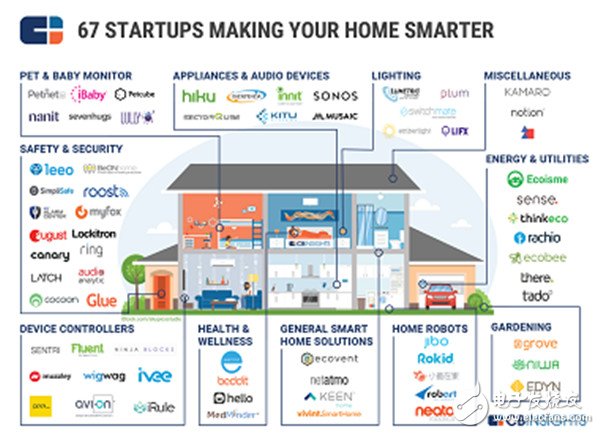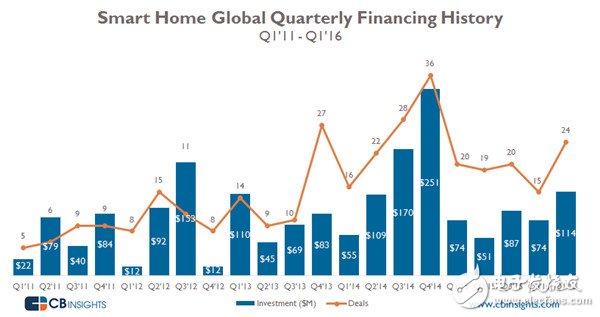From the perspective of industry data analysis and frequent operation of manufacturers, the prospect of smart home seems to be beautiful, but recently the capital market has become colder, and the consumer market has not shown eye-catching performance, highlighting the lack of innovation in the whole industry. Is there a market for smart homes? What is the biggest bottleneck in the development of the smart home industry? This article attempts to spy on you one or two.

View - the "Gorgeous Turn" of the capital market from 2015 to 2016
Analysys think tank published a special research report on China's smart home market last year. According to the analysis, thanks to the increasing number of smart home hardware products in the market, and increasingly popular in the consumer market, China's smart home scale will be in 2016. There has been a significant increase. By 2018, with the improvement of smart home from infrastructure (including systems and big data platforms) to mid-end hardware, smart home products will be accepted by the consumer market, and the market size will reach 180 billion yuan.
By the end of July this year, the domestic intelligent hardware media Zhiwu announced their smart home startup research report. The report shows that in 2016, 12 domestic companies have raised more than 100 million yuan. As a whole, the number of smart home enterprises is large. The classification is rich, and the total financing amount reaches 2.66 billion yuan. Everything looks so good, but in fact, entering the second half of 2016, the attitude of the capital circle to the smart home industry has turned from cold to cold. The big financing that can be checked since June is only one case of Oribo, and the attitude changes rapidly. It’s hard to understand!

Inspect - behind the ice and fire inside the circle
Different from the sound of singing outside the circle, the smart home circle is another scene of enthusiasm, such as Huawei, Xiaomi, e-commerce platforms such as Ali, Jingdong, Internet companies such as Tencent, Baidu, 360, traditional home appliances Manufacturers such as Haier and Midea have entered the "Blue Ocean" in a pile-up manner, hoping to take the lead.
Huawei launched the OpenLife smart home open ecosystem platform. Ali, JD, and Tencent sell smart home products through e-commerce platforms, and provide their own intelligent IoT platforms to these products. These companies enter the technology platform. In the field of smart homes; Xiaomi launched the concept of Mijia this year, which is reduced to zero, to fight the market with single products; traditional home appliance manufacturers only add interconnection functions to existing mature products, in order to improve the user experience.
Although the giants are getting together, China's top technical talents are working hard to develop, but behind the ice and fire in this circle, the innovation of the whole industry is weak. According to iResearch's market research, the user dependence of smart home products is low, and the feedback from users is concentrated in “product instabilityâ€, “susceptibility to damage†and “partial function no valueâ€. The market performance of such products can be imagined, and it is inevitable that they will be greeted by capital when they cannot be realized.
Debate - whether there is a market for smart homes
Smart home products are not just needed now, we do not need to go home, the lights are automatically turned on, the air conditioner automatically starts to adjust the indoor to the most suitable temperature, but can this show that smart home products will not have a market?

Economic theory tells us that the reason for product price fluctuations lies in the balance between supply and demand. The price significance in a period of time lies in the broad consensus of buyers and sellers on the value of products. The scarcity of listed products is artificially high. After the supply is sufficient, prices begin to fall. When the demand is insufficient, the dealer starts to cut the price. Once the price is low enough, the volume will rise immediately. Therefore, the lack of transactions does not mean that there is no market, nor can it be said that the products that are not just needed have no market demand. The drone market is the best footnote, and the current valuation of Dajiang has reached 10 billion US dollars.
We will look abroad again. The CBINSIGHTS research report shows that the company’s annual order volume in the pre-A round of financing has increased by 22% from the order of all companies, from 52% in 2011 to 74 in the first half of 2016. %, the number of companies that have received seed money has also increased. In 2013, only 13 companies received seed funds. Since 2014, the average company with seed money has 25, and investors have many domestic famous capitals. Smart home products have gradually been accepted by the market abroad. According to CNET and ColdwellBanker's survey of American smart homes, more than a quarter of Americans (28%) already have some kind of smart home products. But in China it is another scene, and China’s data has not yet reached 5%.

From the market research of iResearch, domestic consumers have a lot of room for improvement in the awareness of smart home products, and once contacted, the conversion rate into conversion is very high, reaching more than 50%. Obviously, the current smart home product market in China still lacks cultivation, which requires the joint efforts of industry and information channels.
Commentary - technology and ideas are the biggest bottlenecks in development
With the increasingly fierce competition in the smart home industry, hardware manufacturers are increasingly recognizing that smart home products are different from ordinary technology products. Because products penetrate deeply into human living space, the use experience becomes the key to determining the success or failure of a product. similar! Therefore, some people in the industry point out that smart home products are not a hammer sale. In the whole experience of after-sales service, user feedback and product iteration service are the most important concerns for smart home manufacturers, and this is the current smart home enterprise. Generally lacking. Before the Internet thinking that truly serves the users and the user experience is not deep into the bone marrow, smart home enterprises, especially traditional enterprises, still have a long way to go out of the capital winter.
From the perspective of the development of the smart home industry in the world, thanks to the help of the world's top technology companies (even direct acquisitions), smart home products will be plugged into the Internet of Things and artificial intelligence. Once the two technologies are integrated, humans The future of human settlements will undergo profound changes. This (technical innovation) is also the reason why domestic and foreign capital favors these high-tech enterprises. With the theory of Luo Ji, it is not that capital has become paralyzed, but that capital has become paralyzed by unreliable projects.
filter,cylinder,solenoid valve
Wuxi Trenty Machinery & Equipment Co., Ltd. , https://www.elec-inverter.com